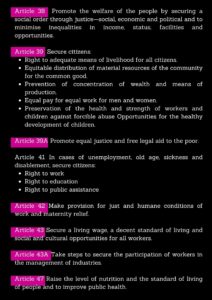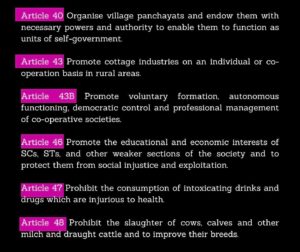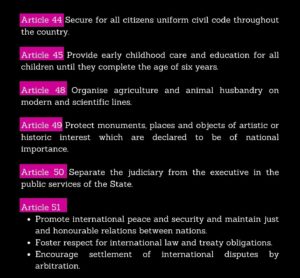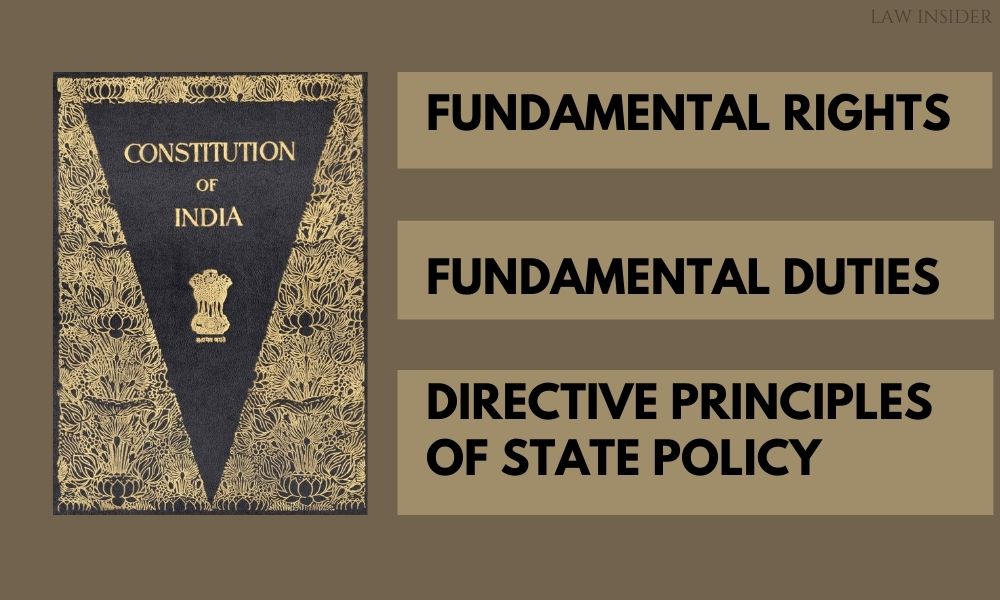By Akanksha Sharma
Introduction
The Constitution of India is considered as the longest written constitution of any sovereign nation in the world. At its birth, it had 395 articles in 22 parts and 8 Schedules and it currently has a Preamble, 25 parts with 12 schedules, 5 appendices, 101 amendment and 448 articles. January 26 is celebrated as the Republic Day every year. The importance of the Constitution was given effect after 67 years and later on, it was amended 101 times also.
The Indian Constitution made provision for the Directive Principles of State Policy (DPSP), the Fundamental Rights and the Fundamental Duties. The DPSP was defined as the State’s obligations to the people while the duties and rights are the obligations of the citizens to the people.
The DPSP got its words from the Universal Declaration of Human Rights by the General Assembly of the United Nations.
During the period of 1947 to 1949, Constitution of India developed and prescribed the fundamental obligations of the State to its citizens and the duties and the rights of the citizens. These were developed under the following sections which constitute the vital elements of the constitution.
What are the various Fundamental Rights?
- Right to equality (Articles 14-18)
Right to equality guarantees equal rights for everyone irrespective of religion, gender, caste, sex or place of birth. It ensures against the discrimination by the state in matters of employment on basis of caste, religion, etc.
- Right to freedom (Articles 19-22)
Freedom is one of the most important ideals cherished by any democratic society. The Indian Constitution guarantees freedom to citizens. The freedom includes-
-
- Freedom of speech
- Freedom of expression
- Freedom of assembly without arms
- Freedom of association
- Freedom to practice any association
- Freedom to practice any profession
- Freedom to reside in any part of the country
- Right against exploitation (Articles 23-24)
The right implies the prohibition of traffic in human beings, beggar and other forms of forced labour. It also implies prohibition of children in factories etc. The constitution prohibits the employment of children under 14 years in hazardous conditions.
- Right to freedom of religion (Articles 25-28)
This indicates the secular nature of Indian Polity. There is equal respect given to all religions. There is freedom of conscience, passion, practice and propagation of religion.
Every person has the right to practice his/her faith, established and maintain religious and charitable institutions.
- Cultural and Educational Rights (Articles 29-30)
These rights protect the rights of religious, cultural and linguistic minorities, by facilitating them to preserve their heritage and culture. Educational rights are for ensuring education for everyone without any discrimination.
- Right to Constitutional remedies (Articles 32-35)
The constitution guarantees remedies if citizens fundamental rights are violated. The government cannot infringe upon or curb anyone’s rights. When these rights are violated, the aggrieved party can approach courts.
What are the various Directive Principles of State Policy (DPSP)?
Articles 36-51 deal with Directive Principles of State Policy (DPSP). There are three directive principles of state policy:
- Socialist Principles
They are the principles that aim at providing social and economic justice and set the path towards the welfare state. Under various articles, they direct the state to:

- Gandhian Principles
These principles are based on Gandhian ideology used to represent the programme of reconstruction enunciated by Gandhi during the national movement. Under various articles, they direct the state to:

- Liberal- Intellectual Principles
These principles reflect the ideology of liberalism. Under various articles, they direct the state to:

What are the Various Fundamental Duties?
The list of 11 Fundamental Duties under Article 51-A to be obeyed by every Indian citizen is given :
- Abide by the Indian Constitution and respect its ideals and institutions, the National Flag and the National Anthem,
- Cherish and follow the noble ideals that inspired the national struggle for freedom,
- Uphold and protect the sovereignty, unity and integrity of India,
- Defend the country and render national service when called upon to do so,
- Promote harmony and the spirit of common brotherhood amongst all the people of India transcending religious, linguistic and regional or sectional diversities and to renounce practices derogatory to the dignity of women,
- Value and preserve the rich heritage of the country’s composite culture,
- Protect and improve the natural environment including forests, lakes, rivers and wildlife and to have compassion for living creatures,
- Develop scientific temper, humanism and the spirit of inquiry and reform,
- Safeguard public property and to abjure violence,
- Strive towards excellence in all spheres of individual and collective activity so that the nation constantly rises to higher levels of endeavour and achievement,
- Provide opportunities for education to his child or ward between the age of six and fourteen years. This duty was added by the 86th Constitutional Amendment Act, 2002.
| Fundamental Rights | Directive Principles of State Policy | Fundamental Duties |
| Part 3 of the Constitution of India contains the Fundamental Rights guaranteed to the citizens of India. They are given in Art. 12-35 of Indian Constitution. There are six fundamental rights mentioned under the Constitution of India. | Part 4 of the Constitution of India contains the Directive Principles. They are given in articles 36-51 of Indian Constitution. | They are given in only Article 51- A of 42nd Amendment Act, 1976 in Chapter IV A. |
| The basic rights that are guaranteed to Indian citizens by the Constitution of India are known as Fundamental Rights. Political Democracy is established in India with the help of Fundamental Rights. | Directive Principles are the guidelines to be followed by the government while framing policies. Economic and Social democracy is established with the help of directive principles. | The Fundamental Duties are defined as the moral obligations to all citizens to help promote a spirit of patriotism and to uphold the unity of India. |
| The welfare of each and every citizen is promoted through Fundamental Rights. And as per government violation of fundamental rights is punishable. | The welfare of the entire community is fostered with the help of directive principles. Violation of directive principles is not a punishable crime unlike violation of fundamental rights. | The Fundamental Duties have been incorporated in the constitution of India to remind every citizen that they should not only be conscious of their rights but also of their duties. In case of violation of fundamental duties it is punishable under Prevention of Insults to National Honour Act, 1971 |
| Fundamental rights are justiciable as they can be enforced legally by the courts if there is a violation. | Directive principles are not justiciable as they cannot be enforced by the courts if there is a violation. | The Fundamental Duties are non- justiciable as their violation is not punishable. But citizens are morally obligated by the Constitution to perform these duties. |
| Fundamental rights are sometimes considered as a kind of restriction imposed on the state. | Directive Principles are directions for the government in helping it to achieve some particular objectives. | The Fundamental duties are considered to be the moral obligations of all citizens to help to promote the spirit of patriotism. |
| Fundamental rights can be suspended during a national emergency. But rights guaranteed under articles 20&21cannot be suspended. | Directive principles of State Policy can never be suspended under any circumstances. | Fundamental rights can be suspended during an emergency byb the President of India under Article 359. |
| Fundamental rights were borrowed from the constitution of the USA. | Directive principles of State Policy were borrowed from the Constitution of Ireland which was also copied from the Constitution of Spain. | Fundamental Duties were added to the Constitution by the 42nd Amendment in 1976, upon the recommendations of the Swaran Committee that was constituted by the government earlier that year. |
86th Constitutional Amendment Act, 2002- The Constitution 86th Amendment Act, 2002 enshrined right to education as a fundamental right in part-III of the constitution. It came up with the below features: Change in Fundamental Rights A new Article 21A was inserted below the Article 21 which made Right to Education a Fundamental Right for children in the range of 6-14 years.
Difference between Fundamental Rights, Fundamental Duties and DPSP
The concept of DPSP emerged from Article 45 of the Irish Constitution. DPSP imposes a duty upon the state not only to protect and acknowledge the Fundamental right of individual but also to emerge the Social- economic goals.
The Directive Principles have been used to uphold the Constitutional validity of Legislation when the conflict arises with the Fundamental Rights. Article 31-C was added by the 25th Amendment in 1971 to provide the supremacy to the Directive Principles in the form of Article 37-C.
The insertion of this Article was to give affect to the Directive Principles in Article 39-B and Article 39-C over fundamental rights conferred by Articles 14, 19 and 31.
Case Laws
- The State of Madras Vs Srimathi Champakam[1]
DPSP cannot override the provisions of The Fundamental Rights
The Supreme Court here held that the DPSP cannot override the provisions of Part III of the Constitution of India i.e. the Fundamental Rights.
Now DPSP has to run a subsidiary to the fundamental Rights and have to confirm them and this was a very important judgement the parliament responded by amending various fundamental rights which were coming in conflict with DPSP.
- I.C. Golaknath and Ors. Vs State of Punjab and Anr[2]
Fundamental rights cannot be diluted
The Supreme Court has said that Fundamental rights cannot be diluted, diminished or taken away and then in response to it by bringing the Amendment Act of the Constitution and inserting Article 31(C) in part III .
- Pathumma and Others Vs State of Kerala and Others[3]
Purpose of DPSP
Here the Supreme Court emphasised on the purpose of DPSP that it is to fix some social- economic goals. The Constitution aims at bringing about a combination between DPSP and Fundamental rights which is reflected in several other cases as well.
- Dalmia Cement (Bharat) Limited Vs The Union of India[4]
Fundamental rights and DPSP are complimentary
The Supreme Court said that Fundamental rights and DPSP are supplementary and complementary to each other and the preamble to the constitution which gives an introduction, fundamental rights, DPSP are conscience of the Constitution.
- State of Kerala & Anr Vs N.M. Thomas & Ors[5]
Disputes between Fundamental Right and DPSP should be resolved
The Supreme Court said that Fundamental rights and DPSP should be built in such a way to be with each other and every effort should be taken by the Court to resolve the dispute between them.
Conclusion
The Fundamental Rights, Fundamental Duties and Directive Principles are two faces of a coin that serve a single purpose, that is, the interest of the citizen. Fundamental rights, Fundamental Duties and Directive Principles provisions are defined under Part III, Part IV-A and Part IV of the constitution.
Fundamental Duties go to the roots of how a citizen acts in the society whereas Directive Principles are the guidelines for the state to create and pass law.
In the recent decision of the Apex and the High Courts, there has been a changing trend by making a harmonious construction between the Part III and Part IV of the Constitution making the Directive Principles justifiable and enforceable on par with the Part III, that is, the Fundamental Rights of the Constitution. They both are complementary to each other.
Reference-
- The State of Madras Vs Srimathi Champakam. 1951 AIR, 1951 ↑
- I.C. Golaknath and Ors. Vs State of Punjab and Anr. 1967 AIR 1643 ↑
- Pathumma and Others Vs State of Kerala and Others 1978 AIR 771 ↑
- Dalmia Cement (Bharat) Limited Vs The Union of India& Ors on 25 April, 1996 [W.P. Nos. 16316, 16404 and 16405 of 201] ↑
- State of Kerala 7 Anr Vs N.M. Thomas & Ors 1976 AIR 490 ↑

